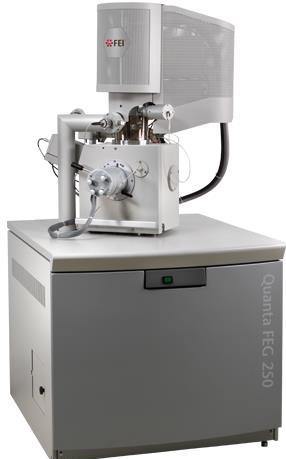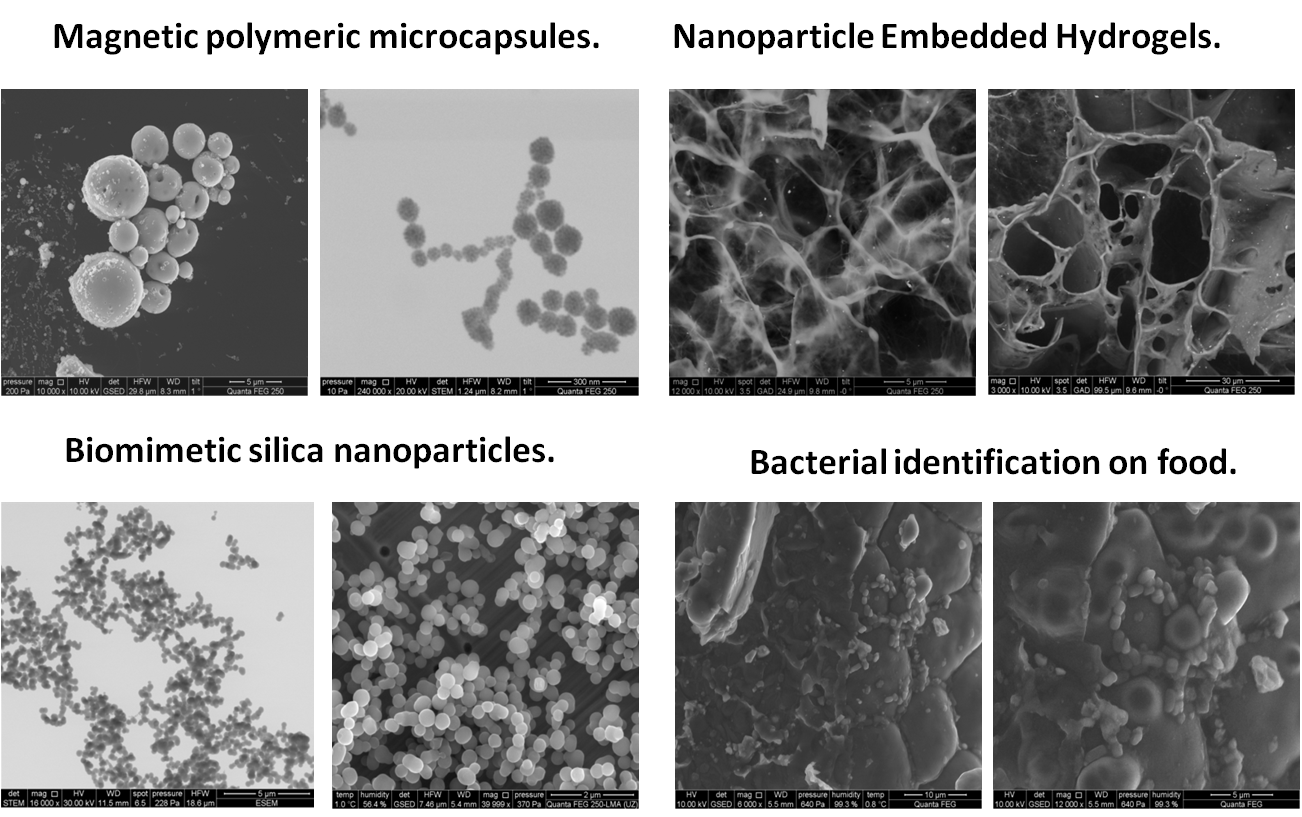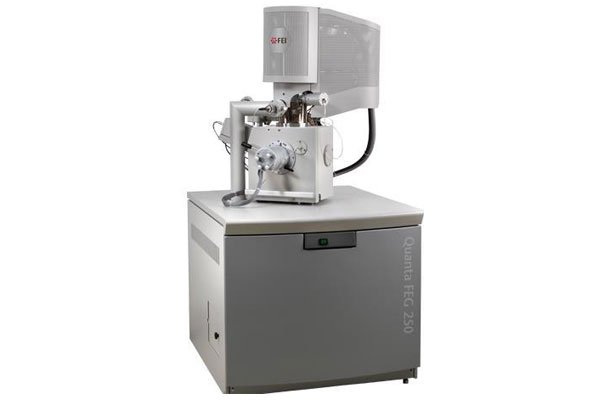The Quanta FEG-250 SEM instrument is an environmental Scanning Electron Microscope used for high-resolution imaging and composition analysis by energy-dispersive X-ray microanalysis (EDS).
The FEG column in Quanta 250 allows beam deceleration, which permits to achieve a resolution of 1.4 nm even at 1 kV electron landing voltage. The Quanta equipment can work under three different pressure ranges, the maximum pressure being 2600 Pa. This permits observation of life-sciences samples without previous metallic coating, i.e., studies in environmental conditions (ESEM).
This microscope allows the use of a Wet-STEM, which permits to analyze samples with controlled humidity and temperature, which is crucial in life-science samples. The SEM-Quanta can also use a heater to perform observations on samples heated up to 1000 ºC and detect changes in the morphology of the material. In addition, this scanning microscope enables the deceleration of electrons on non-conductive samples so that low voltages can be used to avoid damaging the surface of the sample.
The expertise of our scientific and technical staff is also offered to researchers from public and private research centers and also to professionals from industrial sectors that require the use of this instrument.

- What kind of information can be obtained with this instrument?
- Sample requirements
- Technical Specifications
By using the different SEM Detectors with which this instrument is equipped, the following information can be obtained:
- Image with secondary electrons-Topography: using an ETD/FLD (Everhart-Thornley Detector/ Large Field) detector for secondary electrons.
- Image (back scattered electrons) and composition by using GAD/vCD (Gaseous Analytical Detector/Low voltage High Contrast) detector.
- Images with secondary electrons from the gas phase by using a GSED/GAD (Gaseous Secondary Electron Detector/Gaseous
- Elemental chemical analysis by means of Energy-dispersive X-ray spectroscopy (EDX).
- STEM (scanning-transmission) Images by using a Scanning Transmission Electron Microscopy detector.
Analytical) detector, for secondary electrons from the gas phase.
In situ experiments
- Heatting stage: annealing of the sample up to 1000 ºC with observation using a secondary electron detector.
- Peltier stage: changes in pressure, temperature and relative humidity of the chamber observing the sample using secondary electron or back-scattered electron detectors.
- Wet-STEM y STEM: Scanning Transmission Electron Microscopy in wet mode and also at high vacuum with dried samples.
Liquid and non-conductive samples observed at high vacuum mode need to be dried and metallized prior to observation. Samples studied at low vacuum or ESEM modes do not require any previous preparation.
Types of samples that can be studied with SEM-Quanta FEG-250 include:
- Bulk materials, films, coatings, and compacted powders either conductive or non-conductive can be studied.
- Samples compatible with high vacuum, low vacuum and ESEM mode conditions.
- Wet samples.
- Sample can have a diameter from less than 1 mm up to 5 cm for high and low vacuum. ESEM (environmental SEM) observations require small samples (5 mm).
Quanta FEG 250 specifications |
||
SEM |
15 kV |
30 nm |
Maximum beam current |
200 nA |
|
Vacuum |
Modes |
High VacuumLow Vacuum (up to 200 Pa)ESEM (2600 Pa) |
Stage |
X x Y x Z (mm) |
50 x 50 x 50mm |
Detection |
Solid state BSE |
BSED, vCD, DBS |
STEM |
STEM |
|
Low vacuum |
LFD, GAD |
|
ESEM™ |
GSED, GBSD, ESEM-GAD |
|
Imaging |
Scan strategies |
FEI Smartscan™, DCFI |
Cleanliness |
CryoCleanerEC, Integrated Plasma Cleaner |
|
Navigation &large images |
MAPS, Nav-Cam |
|
Chamber |
Large chamber, 10 ports |
|

Laboratorio de Microscopías Avanzadas
We are a unique initiative at national and international levels. We provide the scientific and industrial community with the most advanced infrastructures in Nanofabrication, Local Probe and Electron Microscopies for the observation, characterization, nanopatterning and handling of materials at atomic and molecular scale.
Contact information
Campus Río Ebro, Edificio Edificio I+D+i
Direct Links
© 2021 LMA | Website developed by o10media | Política de privacidad | Aviso legal | Condiciones de uso | Política de Cookies |







